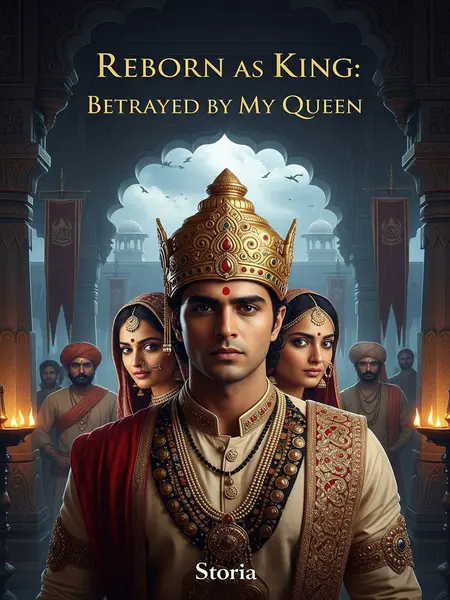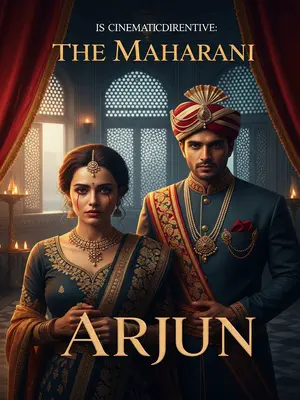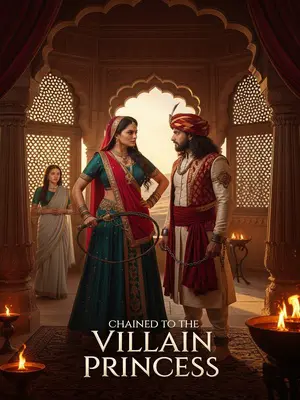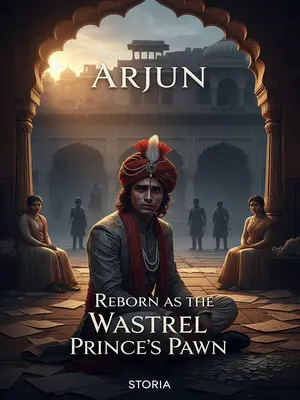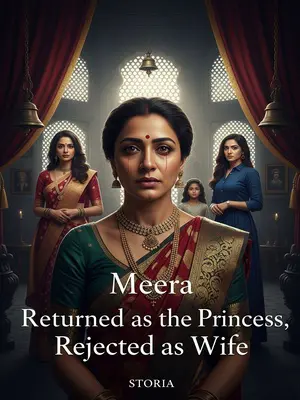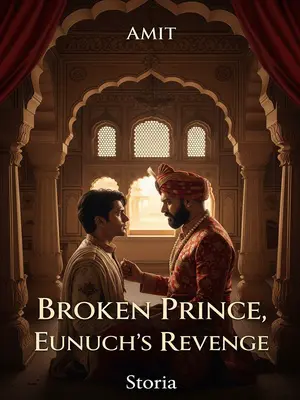Chapter 1: The Storm Breaks
When Rohan’s soul found itself thrust into the era of the late Chalukya dynasty, and his ministers pleaded for peace, his anger erupted, sharp as a monsoon wind:
"You want me to give up our land, pay compensation, and even bow before some petty envoy—am I Raja, or just another man folding hands before outsiders, waiting for scraps like some poor bhikari?"
His words thundered through the durbar. Ministers exchanged anxious glances, shrinking deeper into their angavastrams, some fiddling nervously with their shawls. One minister wiped sweat from his brow, the sandalwood tilak smudging on his forehead. The hall’s tension was as tight as a veena string.
Abandoning all talk of compromise, Rohan, together with the aged General Vikram Singh, set out to reclaim the lost territories themselves.
He strode out, sword clanging at his side, the durbar falling silent behind him. General Vikram Singh, his silver moustache bristling with old pride, nodded gravely and followed, their footsteps echoing through marble corridors lined with fading murals. Outside, the monsoon clouds threatened rain, as if even the gods waited to see what these two men would dare attempt.
But suddenly, Rohan’s mind jolted. It was not just the second year of the Vikramaditya Samvat.
It was the first year of Sultan Timur’s reign.
This was the very year Timur the Lame unified the northern steppes and became the new Sultan. He remembered the old barber’s stories, told over chai in the Mumbai rain: “When Timur’s name comes, even the crows fly away, beta.”
The words hit Rohan like a bucket of cold water. Sultan Timur—the dreaded name that had travelled south on the lips of refugees and traders, spoken in hushed tones in every bazaar from Lahore to Kanchipuram. Even the old granthi in his childhood village used to warn naughty children, "If you don’t behave, Timur’s soldiers will come for you!"
Yet under such pressure, Rohan’s excitement only grew. If anyone in this world could stop Timur from conquering all of Bharat, or even take the place of the great Sultan and rule the nations—
Who but me?
He clenched his fist, a strange thrill surging through his veins, as if the challenge of destiny itself had come knocking at his palace gates. He heard the distant temple bell ring, as if the gods themselves were daring him to act.
---
Thirty-one years of the Rajendra era had ended. Rohan closed his eyes, and when he opened them again, he was back in a resplendent palace in Kaveripur.
The scent of sandalwood oil and jasmine garlands lingered in the air, the marble floors cool beneath his feet, distant sounds of the temple bell drifting through latticed windows. Outside, peacocks strutted in the gardens, their cries mingling with distant shouts of palace guards. Gold-leafed columns rose to a painted ceiling depicting the churning of the ocean.
Memories surged in his mind: endless Deccan wars, old kings favouring scholars over warriors, and decades of humiliation—all flooding his heart.
He felt the weight of history pressing on his shoulders, every scar and defeat echoing in his bones. The ghosts of ancient warriors seemed to pace the corridors, whispering of lost battles and betrayed hopes.
Rohan muttered, "Arrey yaar, I’ve landed in the Chalukya court."
He rubbed his forehead, trying to recall if he’d ever heard of anyone from Bandra ending up in a place like this—what a joke fate was playing now! He looked around for his phone, half-expecting WhatsApp notifications. Nothing. Just heavy embroidered pillows and the faint click-clack of kolhapuri sandals somewhere outside. If only I could forward this drama to my old friends—would they believe me?
Before he could finish sorting his memories, a soft, warm presence pressed against him—curvy yet graceful, alluring yet dignified. Her voice was cold and regal, but her tone gentle and caring.
"Maharaj…"
The rustle of her silk saree, the faintest whiff of attar from her hair, sent a shiver through old Rohan. For a moment, he was caught off guard, his mind flickering to awkward adolescent memories, then snapping back.
Old Rohan shivered.
But the woman’s next words immediately doused his interest.
"Maharaj, if we keep fighting the northern invaders, can our kingdom really win?"
The words dropped like pebbles into a still pond, sending ripples of tension through the early morning hush. Rohan could almost hear the clink of her bangles as she nervously twisted them, her gaze dropping to the floor.
Rohan slowly turned his head and met the gaze of this striking beauty. His brow furrowed, a storm brewing in his eyes.
Hai Ram, the Rani is meddling in politics?
He stifled the urge to groan aloud. In his previous life, such questions would’ve earned a snarky meme forwarded on the family group chat. Here, though, it was deadly serious. He kept his expression neutral, remembering what Dadi used to say: "Beta, never underestimate a woman in silk."
Who the hell are you? If you were my old friend Colonel Deshmukh, maybe I’d respect you, but you’re not him, and you dare interfere in state affairs?
He almost laughed—Dadi would have said, "Beta, never underestimate a woman in silk." These thoughts flashed through Rohan’s mind, and the dangerous aura of a man who had survived countless battles instantly overflowed from his eyes.
The beauty’s body instantly stiffened, as if the person before her was no longer the accommodating king she knew, but a tiger ready to pounce.
A cold wind seemed to pass between them. Even the lamp flame flickered, as if uneasy in the presence of such raw tension. She quickly drew back, her kohl-lined eyes widening in sudden fear. She nervously twisted her bangles, her eyes darting away.
Unable to help herself, the queen shrank back, kneeling on the bed with tears glistening. She said, "I only worry, Maharaj… you hardly rest these days. If something happens to you, what will become of us?"
Her voice trembled, each syllable weighted with both tradition and genuine worry. She pressed her forehead to the silk bedsheet, the very image of a dutiful Rani, but her voice carried the distinct timbre of someone who had learned to wield soft power behind palace walls.
Rani Ananya Devi.
She had no powerful family background. To become queen, besides being well-read, it was entirely due to her exceptional beauty.
The poets used to say her eyes could bend a bow, and her wit could outmatch a court pundit. Rohan recalled court gossip—how the other Ranis envied her grace, and how her long braid had once been the talk of Kaveripur.
Rohan raised his eyebrows, thinking: You don’t need to worry anymore; your king has already died of exhaustion.
So he was Rani Ananya’s king.
He smirked inwardly, remembering tales whispered by the old barber, who’d seen kings come and go: "The throne eats its children, beta." Now, here he was, the latest meal.
This person Rohan knew well—King Amarendra. For the sake of the Northern Campaign, Amarendra, together with the powerful minister Pratap Rao, proposed to further honour General Arjun Dev, making him Maharaja of E, stripping Minister Kailash of all his titles, posthumously revoking his honours, and changing his posthumous name from "Loyal and Dedicated" to "False and Corrupt."
He also called upon the over-sixty-year-old General Vikram Singh and the eighty-year-old poet Lakshman Das to build momentum.
The echoes of their past speeches seemed to linger in the air: "For dharma! For the glory of the Deccan!" But behind the words, he now saw only the cracks in the kingdom’s foundation—loyalty undermined by petty jealousies and old rivalries.
And then it stopped there.
No real generals who understood warfare were employed, no troops reorganised, not even using Vikram Singh to advise on military matters.
So whom did Pratap Rao use?
The central front’s commander had never fought a battle; the eastern front’s commander was clueless, yet every day compared himself to Chanakya.
Chanakya: "…"
Rohan imagined the ghost of Chanakya, rolling his eyes from wherever ancient strategists went after death. Somewhere, the wise old man must have muttered, "Arrey baba, this is not how you run a kingdom!"
These people were greedy for merit, promoted only their own, and within months were all soundly defeated, prompting a massive counterattack from the northern invaders.
Vikram Singh, unable to take the field, resigned in anger, writing, "In haste like the old kings, conquering distant lands, only to win a panicked look northward," and "Who can I ask, is Bheeshma old, can he still eat?"
Rohan could almost picture the old general, hunched over his writing desk, a single oil lamp flickering as he composed those lines with trembling fingers, more sorrowful than angry.
Sixty-six-year-old Vikram Singh retired in dismay, and over-eighty Lakshman Das gazed north toward the Ganga plains.
Lakshman Das, the poet whose verses once brought tears to even the hardest mercenary, now stood silent in the palace gardens, watching the horizon darken with clouds and vultures. Every stanza he wrote now reeked of impending doom.
If not for Rajeev Sharma emerging on the eastern front, running back and forth to block the invaders… the enemy would have reached the Narmada again.
Even now, stories of Rajeev’s valour circulated in the bazaars, his name invoked by mothers hoping to inspire their sons to greater deeds. Yet Rohan knew, deep down, that a handful of brave hearts could not stem the tide alone.
So throughout the court, everyone was discussing peace, even Rani Ananya in the palace began whispering in bed.
The walls seemed to have ears—every word, every sigh, carried to the corridors and echoed in the courtyards, as if even the marble statues of old kings grieved at the state of the realm.
Pratap Rao was still holding on.
The western front was Malwa, led by Colonel Nikhil. The Nikhil family had commanded troops in Malwa since the early Chalukya days, three generations as commanders—Malwa’s only remaining hope for the Northern Campaign.
Palace gossips would whisper, "Malwa ke sher hain!"—the lions of Malwa. Yet Rohan could feel, from the tone of recent letters, that the old courage was fading, replaced by something colder and more self-serving.
Pratap Rao: "Maharaj, the sons of Malwa are brave and will surely defeat the enemy."
Rohan rubbed his temples.
Headache.
He pressed his fingers to his forehead, wishing for a strong decoction of filter coffee, the way Amma used to make when he came home defeated from cricket matches as a boy. But here, in this echoing palace, he had only his own resolve to rely on.
Others might not know, but he knew all too well—there was no hope on the western front.
The betrayal had already taken root; Rohan could sense it in every delayed message, every vague report that reached the capital.
Nikhil had already betrayed the country. By the end of this year, he would cede four districts to the invaders, send countless Malwa and Gujarat sons to be slaughtered, then accept the invaders’ investiture and call himself Raja of Malwa.
Even if Rohan knew this, the Nikhil family had commanded Malwa for three generations. If you sent someone now to accuse them of rebellion, not only would it be too late, but no one would believe it.
Loyalty and tradition—such double-edged swords! Even the village barber knew: "Blood is thicker than water, but greed is thicker than both."
The west wind blew; it was almost October. This Northern Campaign was clearly beyond saving.
The air was heavy with the promise of rain, and the festival lights strung up for Navratri flickered as if uncertain about their place in a time of such despair. The war drums had grown silent, replaced by the hollow sound of dhols in empty courtyards.
Rohan let out a breath, thinking it didn’t matter. Since he had come to this era, he would purge the bureaucracy, reform the military, and in three to five years, still destroy the invaders and honour the blood of these recent heroes.
A surge of determination welled up in him, the stubborn optimism found only in those who’d seen too many impossible situations. Somewhere in the distance, the temple conch sounded the evening aarti, and he took it as a sign—there was always a way forward, if only one had the courage to take it.
Rohan raised his eyebrows and smiled, thinking: When I was in my thirties, who in the world could withstand my army?
Perhaps seeing him smile, Rani Ananya finally spoke.
She knelt at the bedside, crying as she said to Rohan, "Maharaj, I know I don’t understand state affairs, so even though Pratap Rao looks down on me and wants to harm you and our child, I didn’t stop him from launching the Northern Campaign.
But now we have lost again and again, and he still insists on war. I voiced my worries, and you frightened me like this… Even if I’m at fault, have you ever considered my feelings?"
Her voice broke, the words tumbling out like the first monsoon rain after a long summer drought. Tears tracked down her cheeks, catching on the gold of her nose ring, as she clung to the hope that her sincerity would soften him. She avoided his gaze, her fingers still nervously tracing her bangles.
Rohan looked at the pitiful Rani Ananya, coldly laughing inside.
A seasoned drama queen, indeed.
He watched her performance, not unappreciative of her skill; he could almost see her in a saree on an afternoon soap, trading barbs with a villainous saas. But this was the royal court, and the stakes were far higher.
Controlling Amarendra is no problem, but trying to manipulate old Rohan? She’s overestimating herself.
Her skills may be top-notch, but old Rohan has read the history books.
After the Northern Campaign failed, Rani Ananya, together with the Deputy Minister of Rituals, Mr. Sharma, and the Commander of the Palace Guard, Inspector Kunal, forged a royal edict, killed Pratap Rao, and negotiated with the invaders.
With ministers, queen, and the palace guard commander—such a lineup could even kill a king.
The sort of intrigue that would fill the pages of an Amar Chitra Katha, or send whispers flying through the women’s wing of the palace. Old Rohan, though, had seen enough of boardroom betrayals and dinner table politics to recognize the pattern at once.
So for the next ten years, the court was controlled by Rani Ananya and Mr. Sharma.
In hushed corridors, their names became a byword for cunning. The same people who now trembled before the king would soon be paying obeisance to her.
Rohan quietly watched her performance, inwardly wanting to banish the manipulative queen.
But he couldn’t.
This Northern Campaign was doomed; to reform the military and strengthen the army, he needed to stabilise the ministers and plan long-term.
Getting rid of the queen would only alert the enemy.
So Rohan kindly said he had just been thinking of something else, and it was not his intention to frighten the queen.
He softened his voice, even managing a small smile. "Bas, Rani sa, don’t trouble yourself. I was just lost in thought, that’s all."
"Then what was Maharaj thinking about?"
"Thinking that all the civil and military officials are useless and should all be thrown out," Rohan half-joked.
He chuckled, the sound laced with both bitterness and bravado. "Honestly, Rani, if I could start over, I’d fill the court with housewives and paan-wallas. At least they know how to get things done."
Rani Ananya, while dressing, threw him a flirtatious, reproachful glance.
She draped her pallu over her shoulder with practiced grace, a slight pout on her lips. "Maharaj, always joking—even in times like these."
Rohan truly thought so; whether in the palace or outside, in the court or at the frontier, the only one he valued was Vikram Singh.
He remembered the old general’s loyalty, the way Vikram’s presence seemed to command respect in the barracks and on the battlefield alike.
Everyone thought the northern invaders were the main enemy, but only Vikram Singh wrote in his petitions that the invaders would surely perish, and the real enemy would rise from the even fiercer northwest. When that time came, if the Ganga plains and the Deccan did not prepare for war, they would be destroyed.
But the empty court heard nothing.
Sadly, Vikram Singh was already old, sixty-six, and it was uncertain if he could live to see the Northern Campaign.
He pressed his lips together, a pang of regret twisting his heart. The kingdom’s last hope lay in hands already trembling with age.
At this thought, Rohan suddenly caught his breath, his pupils trembling violently.
A sudden realization jolted him, as if someone had poured a glass of ice-cold buttermilk down his back. He stared into the flickering lamplight, heart pounding.
Since crossing over, the war with the invaders had been overwhelming, making him forget something.
The second year of Vikramaditya Samvat, besides the Chalukya-invader war, seemed to have another extremely important event.
He remembered the old barber’s stories, told over chai in the Mumbai rain: “When Timur’s name comes, even the crows fly away, beta.”
Rohan brushed aside Rani Ananya, letting her fall to the floor with a startled scream, and rushed straight to the study. The attendants and palace maids along the way were panicked, not knowing what had happened to the king.
He moved like a man possessed, barely noticing the shocked cries behind him. Servants scattered, some whispering prayers to Hanuman for protection as the king barrelled past.
Rohan flipped through one royal decree after another, tossing page after page, white paper swirling in the study like snow, until he finally found the news he sought.
Ink-stained scrolls and brittle parchments flew everywhere, settling on the mosaic floor in drifts, some landing on the burning diya, its flame flickering dangerously close.
In an unnoticed corner, it was recorded that six or seven months ago, after much war, the distant northern grasslands had been unified.
Under the sunlight, Mongol ministers and the chieftains of various tribes knelt in a dark mass, only a wolf-like man standing in the light.
Drums thundered, chieftains and ministers shouted, conferring a title upon the hero who unified the grasslands.
The title: Timur the Lame.
The mere name seemed to cast a chill over the room. Somewhere outside, a koel cried, as if sensing the arrival of a new era.
So the second year of Vikramaditya Samvat was the first year of Sultan Timur.
It was the year Timur pacified the steppe, became Sultan, and began to gaze upon the world.
A silence fell in the study, so profound that even the mice dared not rustle. This was the moment, Rohan realized, that history turned on a knife’s edge.
Rohan’s breathing quickened, his heart pounded, his temples throbbed, and he lost all confidence and composure in treating the invaders as his only opponent.
Sweat pricked his brow, the heavy scent of sandalwood now mingling with something sharper—fear, or perhaps excitement. He gripped the table, trying to steady himself.
This is Timur!
He remembered the old barber’s stories, told over chai in the Mumbai rain: “When Timur’s name comes, even the crows fly away, beta.”
Five years of reform and training, eight years to destroy the invaders—easy mode, that’s fine.
But this isn’t easy mode; there’s a hidden boss!
He almost laughed at the absurdity, the way life always seemed to throw one more challenge at you just as you caught your breath.
In eight years, Timur could destroy the kingdoms of the northwest, and even rob the invaders along the way.
By then, even matching Mongolia’s national strength would be hard, let alone fighting their peak cavalry on the battlefield.
What can be done now?
His mind raced, every lesson from every childhood Amar Chitra Katha and late-night discussion at the chai tapri whirling through his thoughts. Was there a way to turn the tide?
Rohan braced himself on the table. Outside the door were the queen and a group of attendants and maids. White paper covered the floor, and as the west wind blew, it fluttered everywhere.
The rustle of the paper mingled with the distant roll of thunder, a symphony of chaos that matched the storm inside his heart.
Time seemed to slow. Rohan could not hear the voices outside, only his own heavy breathing.
Thump, thump—Rohan’s heartbeat was like a dhol, but his eyes grew ever more determined. A century’s frost and hardship passed through them; from street urchin to king, the thorns and fire also leapt from his gaze.
Blood and storm, mountains of corpses and seas of blood—Rohan always played on hard mode.
He remembered the time his father had told him, "Beta, you may be born on the footpath, but you must live like a lion." The same spirit now roared through him, refusing to surrender.
A burst of laughter rang from Rohan’s mouth, echoing far and wide. That laughter pierced the clouds and shattered the singing and dancing of the Deccan, startling the cowardly ministers, leaving only a heroic spirit spanning heaven and earth.
The echoes carried through the palace, startling a flock of pigeons into flight. Somewhere, a startled servant dropped a tray of brass lotas, the clatter swallowed by Rohan’s unrestrained mirth.
Timur is peerless in this world; to have such an opponent, a real man could die without regret.
He felt the old fire blaze anew—this was no time to cower, but to rise and meet fate head-on. In that moment, the king who had once been a mere pawn became the player.
Those heavy breaths, throbbing veins, were not from pressure or fear; his eyes blazed, lips curled in a smile, his whole body brimming with excitement.
Come, Timur! If anyone in this world can stop your Sultanate from swallowing the four corners, or even replace your Sultanate and unite the nations…
Who but me?
Rohan slapped the table, looked up, and shouted outside: "Pass my decree: in fifteen days, I will summon all officials to discuss the strategy of war and peace."
His voice echoed down the marble corridors, scattering birds from the banyan trees outside. The courtiers looked up in shock, their daily routine shattered by the king’s sudden resolve.
Still want peace talks? Go tell your mother! To fight Timur, there’s no time for step-by-step caution.
He grinned, a touch of mischief in his eyes. The old rules of the game were gone; it was time for a new playbook.
Rohan looked to the west wind: "This Northern Campaign, I must win."
The wind seemed to answer, carrying with it the scent of impending rain and a promise of battle.
Outside, the peacocks screamed as the first drops of rain fell—a sign, perhaps, that the gods themselves were watching.
